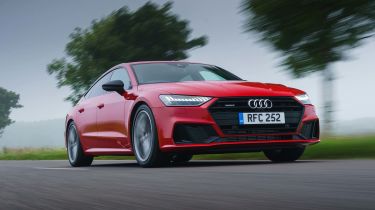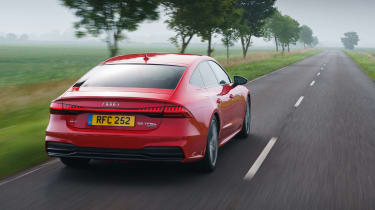Audi A7 hybrid review
The Audi A7 TFSI e is good-looking, technologically advanced and efficient plug-in hybrid executive car, but it fails to impress enough to warrant its high price tag

Pros
- Sleek A7 shape
- Fantastic interior
- Ultra-low running costs
Cons
- Four-cylinder engine not great
- Not very involving to drive
- Ride a bit too harsh
| Car type | Electric range | Fuel economy | CO2 emissions |
|---|---|---|---|
| Plug-in hybrid | 40-42 miles | 202-235mpg | 30-33g/km |
In addition to Audi’s rapidly expanding ‘e-tron’ range of electric cars, the brand also offers a plug-in hybrid version of almost all its primarily petrol and diesel-powered models. As well as the plug-in variant of the A3 hatchback, A8 executive limousine and Q3, Q5, Q7 and Q8 SUVs, Audi has also created an electrified version of its four-door coupe: the A7.
Much like the plug-in versions of the A6 saloon and A6 Avant estate, two electrified powertrains are offered for the A7: the 50 TFSI e, with 295bhp, and the 55 TFSI e, with 362bhp. In both cases, the same electric motor and 17.1kWh battery feature – only the power output of the four-cylinder turbo petrol engine changes.
Overall, the A7 TFSI e is a mixed bag – appealing, yes, but not without compromise. As many would expect of a large executive Audi, build quality is excellent, styling is classy, performance is plentiful and practicality is strong. Not to mention the impressive safety credentials and potentially low running costs. Still, it’s hard not to draw comparisons with the petrol and diesel A7 models (or even traditionally fuelled rivals from the likes of BMW and Mercedes), which regularly trump the plug-in A7.
For example, when running solely on battery power, the efficiency for such a large car is great and the ride nice and relaxed – but this only lasts for a while. Soon, the battery runs out and the petrol engine has to cut in. In the process, it reminds drivers that they don’t have a velvety smooth six-cylinder engine firing away under the bonnet.
Instead, they have fewer cylinders and this much is obvious when accelerating hard. This is, perhaps, the key takeaway from a hybrid A7; if maximising the potential of the battery and electric motor is possible, then the A7 TFSI e makes a strong case for itself. If not, it could be better to look elsewhere to avoid the compromises in terms of practicality and performance that the plug-in A7 models demand.
That said, for company-car drivers, the model's low Benefit-in-Kind tax rate might make the A7 plug-in a winner regardless. Thanks to low CO2 emissions, it has comparable monthly company-car tax bills to a mid-range diesel Audi A3. Also, despite being a sleek four-door coupe, the A7 scores quite highly for interior and boot space compared to saloon or estate alternatives. The upshot of this is those looking for a large family car could realistically consider an A7. That is, unless they have a St Bernard or two to fit in the (rakish) boot.
For reference, the A7 hybrid’s boot is fractionally smaller than that of a Volkswagen Golf – and even more so than a petrol or diesel A7's. Granted, the Golf’s boot is hardly tiny, but that car is considerably smaller and more affordable than the big Audi. Despite the TFSI e not being the most practical or most potent model in the A7 line-up, there’s still a lot to like about the big German hatchback – all of which is discussed in greater detail in the rest of our in-depth review...
